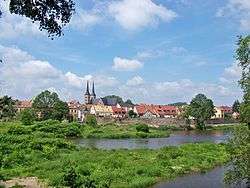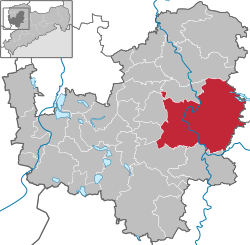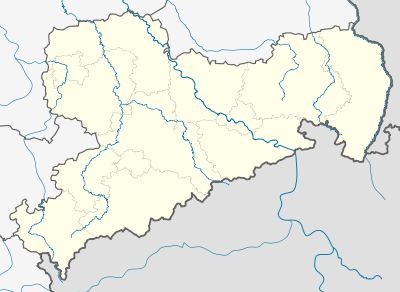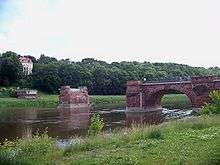Grimma
Grimma (Upper Sorbian: Grima) is a town in the Free State of Saxony, Central Germany, on the left bank of the Mulde, 25 kilometres (16 mi) southeast of Leipzig. Founded in c. 1170, it is part of the Leipzig district.
Grimma | |
|---|---|
 | |
 Coat of arms | |
Location of Grimma within Leipzig district  | |
 Grimma  Grimma | |
| Coordinates: 51°14′19″N 12°43′31″E | |
| Country | Germany |
| State | Saxony |
| District | Leipzig |
| Government | |
| • Mayor | Matthias Berger |
| Area | |
| • Total | 217.38 km2 (83.93 sq mi) |
| Elevation | 128 m (420 ft) |
| Population (2018-12-31)[1] | |
| • Total | 28,180 |
| • Density | 130/km2 (340/sq mi) |
| Time zone | CET/CEST (UTC+1/+2) |
| Postal codes | 04668 |
| Dialling codes | 03437 |
| Vehicle registration | L, BNA, GHA, GRM, MTL, WUR |
| Website | www.grimma.de |
Location
The town is in northern Saxony, 25 kilometres (16 miles) southeast of Leipzig and 16 kilometres (9.9 mi) south of Wurzen.
Flooding
The river Mulde flows through the town, a significant section of which is situated in a floodplain. Massive floods in 2002 washed away the old Pöppelmannbrücke bridge and caused significant damage to buildings in the town. In the summer of 2013 there was further flood damage.

Suburbs
- Großbardau (merged with Grimma January 2006)
- Döben
- Hohnstädt
- Höfgen
- Beiersdorf
- Kaditzsch
- Schkortitz
- Naundorf
- Neunitz
- Grechwitz
- Dorna
- Kleinbardau (merged with Grimma January 2006)
- Bernbruch (merged with Grimma 2006)
- Waldbardau (merged with Grimma 2006)
- Nerchau (merged with Grimma 2011)
- Thümmlitzwalde (merged with Grimma 2011)
- Großbothen (merged with Grimma 2011)
- Mutzschen (merged with Grimma 1 January 2012)
History
Grimma is of Sorbian origin and was first documented in 1065. The Margraves of Meissen and the Electors of Saxony often resided at the castle in the town.
The city was chosen as one of three government elite boarding schools, the 'Princely Schools of Saxony', in 1550. The purpose of these schools was to educate future civil servants and to prepare them for further studies at universities which is why a number of historical personalities are biographically related to this rather small city. The Gymnasium St. Augustine still exists today as one of only a few public boarding schools in Saxony.
Grimma was the scene of witch trials between 1494–1701. At least two women were executed as witches.[2]
Due to the city being located at the second main railway line between Leipzig and Dresden (via Meissen), the city developed well in the 19th century.
By 1890 the population had reached 8,957.[3]
The city was affected by heavy flooding in 2013. Work had by this time started on the construction of flood barriers, but their completion had been delayed by local opposition [4]
Culture
Grimma has been the site of many historic structures, including a town hall dating from 1442, a famous school (the Fürstenschule) erected on the site of a former Augustinian monastery in 1550, and a school of brewing.[5]
Notable people
- Albert III, Duke of Saxony (1443–1500)
- Catherine of Saxony, Archduchess of Austria (1468–1524)
- Ernst Otto Schlick (1840–1913), engineer
- Georg Elias Müller (1850–1934), psychologist
- Erich Waschneck (1887–1970), playwright
- Diethard Hellmann (1928–1999), musician
- Verena Reichel (born 1945), translator
- Ulrich Mühe (1953–2007), actor
- Jochen Kupfer (born 1969), operatic baritone
- Carmen Nebel (born 1956), TV moderator
- Olaf Beyer (born 1957), athlete
- Matthias Lindner (born 1965), footballer
- Torsten Kracht (born 1967), footballer
- Marina Schuck (born 1981), sprint canoer
- Ronny Garbuschewski (born 1986), footballer
- Rosa-Marie Tischendorf born June 2, 1877), niece of Konstantin Tischendorf
Miscellaneous
Grimma is the sister city to Devon, Alberta, Canada. in 2008, a group of students and dignitaries from Devon travelled to Grimma to perform in an international music festival. In 2010, members of the Grimma Jugendblasorchester (Youth Orchestra) travelled to Devon to perform and to tour Alberta.[6]
Notes
- "Bevölkerung des Freistaates Sachsen jeweils am Monatsende ausgewählter Berichtsmonate nach Gemeinden" (PDF). Statistisches Landesamt des Freistaates Sachsen (in German). July 2019.
- Manfred Wilde: Die Zauberei- und Hexenprozesse in Kursachsen. Köln, Weimar, Wien 2003, S. 508f.
- The Century Cyclopaedia of Names, coordinated by Benjamin E Smith and published by the De Vinne Press, New York 1894
- spiegel.de 2013: Versäumter Hochwasserschutz: "Diese Flut kommt vier Jahre zu früh"
- The latter has been claimed in Encyclopædia Britannica 1911: Grimma as follows: "There are also a modern school, a teachers' seminary, a commercial school and a school of brewing." The following three sources are given: "See Lorenz, Die Stadt Grimma, historisch beschrieben (Leipzig, 1871); Rössler, Geschichte der königlich sächsischen Fürsten- und Landesschule Grimma (Leipzig, 1891); L. Schmidt, Urkundenbuch der Stadt Grimma (Leipzig, 1895); and Fraustadt, Grimmenser Stammbuch (Grimma, 1900)." (all three German language)
- nurun.com. "Funding for Grimma visitors secured, itinerary ..." Devon Dispatch. Retrieved 2017-09-07.
References
- Chisholm, Hugh, ed. (1911). . Encyclopædia Britannica (11th ed.). Cambridge University Press.
Gallery
 The High School St. Augustine of Grimma
The High School St. Augustine of Grimma Frauenkirche
Frauenkirche Sawmill Höfgen
Sawmill Höfgen Old city as seen from the Mulde river
Old city as seen from the Mulde river The bank of the Mulde
The bank of the Mulde Armorial bearings on a bridge over Mulde in Grimma
Armorial bearings on a bridge over Mulde in Grimma Destroyed bridge over Mulde in Grimma
Destroyed bridge over Mulde in Grimma Memorial to the flood disaster 2002 in Grimma
Memorial to the flood disaster 2002 in Grimma
External links
- . Encyclopedia Americana. 1920.